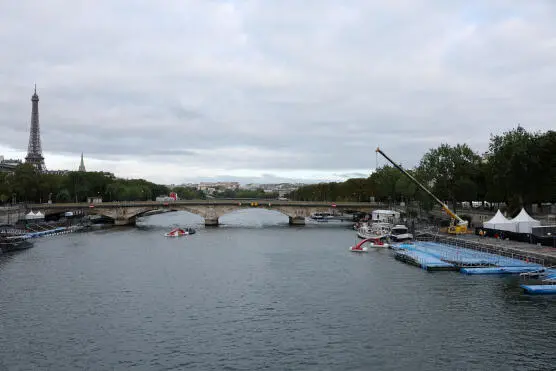
Paris, June 7, 2024—French capital authorities announced on Friday that an open—water swimming test event scheduled for next week in the Seine has been canceled due to heavy rainfall.
The decision underscores ongoing concerns about water quality in the Seine, which will host triathlon and open-water competitions during the Paris 2024 Olympic Games.
Recent heavy rains have significantly increased pollution levels in the river, prompting officials to cancel the event. The rainfall has overwhelmed Paris’ sewerage system, leading to higher-than-acceptable levels of pollutants in the water.
“The discharge in the Seine before Monday’s now-scrapped event was measured at 349 cubic square meters per second, far exceeding the desired level of 100 cubic square meters per second needed for this summer’s events,” officials stated.
Despite the inauguration of a new water treatment plant upstream of Paris at the end of April, the city’s water management infrastructure is still under strain.
Another critical Olympics-related water infrastructure project, a massive underground stormwater facility near the Austerlitz train station in eastern Paris, is yet to become operational.
This facility, which is expected to store stormwater and prevent discharges into the river, is scheduled to come on stream in early June.
The postponement of the test event is a setback for Paris, which has invested heavily in improving the Seine’s water quality as a key legacy achievement of the 2024 Games.
Mayor Anne Hidalgo has made a high-profile promise to create three public bathing spots along the river by next year. The goal is part of a broader effort to revitalize the Seine and enhance its recreational use for Parisians and visitors alike.
French authorities have allocated approximately €1.4 billion ($1.5 billion) to upgrade sewage treatment and stormwater facilities around Paris. These improvements are aimed at significantly reducing the amount of untreated fecal matter that flows into the Seine and its main tributary, the Marne.
The investments are seen as crucial steps toward ensuring the river meets the stringent water quality standards required for Olympic events and public use.
The cancellation also highlights the challenges faced by cities hosting major international sporting events. Ensuring the environmental readiness of venues is a complex task that involves significant infrastructure upgrades and coordination among multiple agencies.
The situation in Paris is further complicated by climate change, which has led to more frequent and intense rainfall events, exacerbating the strain on urban water management systems.
As the countdown to the 2024 Olympics continues, Parisian authorities remain optimistic that the necessary infrastructure will be in place and operational in time for the Games.
“We are committed to delivering a safe and enjoyable experience for athletes and spectators,” said an official from the Paris 2024 organizing committee.
“The health and safety of all participants is our top priority, and we are taking all necessary measures to ensure the water quality meets the required standards.”
In the meantime, the city is working to mitigate the immediate impacts of the recent rainfall and is closely monitoring the water quality in the Seine.
The next steps will involve enhanced treatment protocols and continued infrastructure development to handle future weather events more effectively.
The Paris 2024 Olympics will serve as a critical test of the city’s ability to balance the demands of urban development, environmental stewardship, and international sporting excellence.
As preparations continue, the world will be watching to see how Paris navigates these challenges and delivers on its ambitious vision for the Games.
This article was created using automation technology and was thoroughly edited and fact-checked by one of our editorial staff members